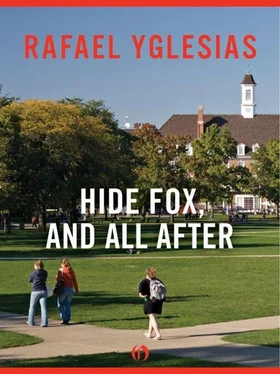With this submission, Alec fell even farther from grace. His image was now swollen and degenerate with imperfection. He was fitting easily into a cubbyhole; another human that Raul could dissect. The criticisms of Alec’s acting that Raul had heard and ignored returned to his mind. The insecurity of his ego sexually shattered the image of the seducer. His mother’s sharp dominance closed the case definitively. Raul usually delighted in such discoveries, but with Alec he fought the investigation of each weakness. There wasn’t that Messianic sense of power that someone else was predictable. He had lost his Alec: the delusion that had made a comrade.
Realizing this, he still buried it. Perhaps I am being bitter, he thought. This sudden criticism may come from my ego.
A terrible languor followed Raul’s separation from Alec, and if he didn’t subside totally into a heap, it was because Alec assured him that his mother would be over her anger in a week or two. She dropped her demand that Alec work for his spending money almost immediately, and Alec expected her capitulation on banning Raul shortly.
Raul lay passive for two weeks. Final exams were coming up, but he seemed barely to notice them. During the third week, meeting Alec in the theater, Raul was told that Anita planned to invite him for dinner.
“She’ll give in soon,” Alec said.
“It’s late, Alec. School will be over in a little while, and then I’ll be off to the country. You should have fought her earlier.”
“I explained to you why I don’t.…”
“Yeah, I’m sorry. Forget it, I’m just terribly angry at her.”
“I can understand that.”
But did he understand? Did the relationship hold the significance for him that it held for Raul? Alec seemed like a child smashing an old toy.
He was invited for Friday night, and in the middle of dinner, Thursday, the phone rang. Raul rose from the table — his parents had company — and answered the phone.
“Raul.” It was Alec. He was whispering, low, intense and frightened. “My mother found my grass. All hell’s broke loose.”
A hot New York night, bright and alive. Alec told his mother that he had to go out for a walk; Raul and he met, taking the 104 bus to Columbus Circle.
Neither Alec nor Raul could avoid enjoying the air of catastrophe; they heightened it, smiling sheepishly with exclamations of “Oh, my God, we’re ruined!” They walked frantically through the city streets, lamenting conspicuously. Ah, the glory of this parade of despair. If alone they were afraid of this disaster, together their drama reduced it to an interesting scenario. For an hour their unity returned.
They talked of running away, neither for a moment seriously intending to. But the romance of it keyed them up, their vitality, hopes, and ideals suddenly free.
Yet this was fatal. Which one would break the acting, the scene, the love? Neither could do it separately, and a rare loss of sanity caused them not to end together.
Alec finally said he would have to call his father. He was close to him, and he wouldn’t leave without first discussing it with him. Why didn’t Raul then say, “Let’s forget it?” He knew it was over, why did he allow it to drag on?
Again, he watched a mad suicide without stopping it. Though superficially no major rift seemed to be going on, Raul was breaking the rules of their game. He allowed this dwindling descent from the scene to reality. It was humiliation for both; a corruption of the rare contact they had. And he knew it.
Alec spoke to his father for more than a half hour. This was a process well rehearsed: his father was the opium to subdue any rebellion against his mother’s dominance, while allowing Alec his self-respect. His father would promise to calm her, and thereby would calm Alec. He’d lower his voice and they’d be conspiratorial — without laying any plans, without any results.
This isn’t a novelty among adolescent relations with parents. Perhaps this was preferable; far less humiliating than having to dope oneself. Then one must openly admit cowardice, Raul thought. However responsible the advice one takes against rebellion, the reason is still fear. No matter how sound and true the objections, its appeal lies in the ready rationalization. The lengths Raul would go to at times to excuse himself from action were laughable.
Alec finished his call. “He said I should wait a week or two and see if she calms down. He promised he would call her right after speaking to me.”
“Well,” Raul said, smiling, “that’s certainly reasonable.”
Alec’s house was unconditionally denied to Raul. With only a week or two left in the school year, it was unnecessary for Alec to go to classes. Raul, therefore, didn’t see him.
On the following Monday, Miller announced that Michael Sussbaum would play Iago in next year’s production of Othello.
The pressure was overpowering. No friendly voice greeted Raul. His parents, his teachers, his advisers, and his brother all urged him to study for final exams. Returning to the company of his classmates, he found them doubly intolerable. Everywhere waste and frustration.
With his parents anxious that he should study, Raul was forced to fake it. At night he would have to move quietly and lower his voice to a whisper, since they insisted he get his sleep. He found that he couldn’t read; no novel held his interest. Writing was also impossible: he wished one could verbally express a scream. He felt he was in an ever diminishing cage, his inner rage at the restriction. Senseless values were cutting off all that was vital to him. The nearest he came to a personal identity was being angry at these jailers.
There was no attitude he could take that didn’t fit nicely into their conception of an adolescent. So consistent and determined was this condescension that Raul felt he could easily throw them all into one box and label it Them. They. You people. He hated everyone now.
The black prince rode again in Raul’s poetry. At night Raul would turn the lights off and sing of the avenging man at the beach. The spray of the sea on him, dawn breaking above him. The swirl of the sea and the sky, his cape fluttering in the wind.
Only this lonely figure calmed him. Brief, cool peace. He wanted solitude. He wanted something mysterious and sublime from the earth and from his talent. He knew his identity: he wished its means and recognition.
Perhaps these desires had never been more infused with egotism. He could not allow even the slightest condescension, and it came now from all sides. Never failing to hit their mark, all authorities knifed him with their arrogance and maddening irrelevancy.
Even the well-intentioned blundered stupidly. Miller, Bowden, and White all found convenient clichés to convince Raul; nothing could repel him more. As for Henderson’s promises, their influence had weakened considerably. Alexander and his course were no longer attractive. With the loss of Iago, and the knowledge that Miller would not do Shakespeare in later years, the theater’s value disappeared. Yet the lure of a scholarly life couched in ease by Henderson’s energetic liberalism was strong enough to keep him at the school.
All this bred a frantic inner life for Raul. He violently withdrew from contact with others. He practiced silence in school, speaking only when it was impossible to do otherwise. Creating a mystique, he recognized people only when he had translated them into this code. He tried to burrow deeply within himself and snugly bed down for the cold winter.
His world ranged in imagery from the lonely to the bitter. He pumped his mind with poetry, surviving the day by relating the commonplace to an image. But he could not live this way. His life barely had direction before this, but it had had joy, and that was gone. The routine refined a system that gradually ate away at his patience and sanity. So much activity with so little importance or interest infuriated him. He needed time, to stay sane, if for nothing else.
Читать дальше











